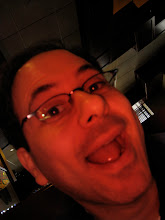After far too many weeks off, I am back. The holidays does find ways to suck up time, ya know?
Over the weekend Mom and I went to see the Chicago premiere of an English-language modern opera called - you guessed it - Doctor Atomic. Shortly into the First Act, the phrase came to me:
"Doctor Atomic Bombed"
Would I ever taint my review of an opera solely to use a pithy turn of phrase? Well, perhaps I would, but I assure you that in this instance it is not the case.
Doctor Atomic, composed by American John Adams, with a libretto by Peter Sellars (not the funny one), premiered at the San Francisco opera on October 1, 2007. At the time, I was dating a gal who lived in The City (as natives are likely to refer to SF) and desperately wanted to see the opera after reading generally positive reviews. Alas, I never made it to a performance there, so I was absolutely delighted when the Lyric Opera decided to stage a Chicago production this season.
I read up on a bit on the performance, so I knew that the opera focused on J. Robert Oppenheimer and the Manhattan Project. Still, when Mom and I learned that Sellars (who directed the Lyric's production of Doctor Atomic) would be giving a lecture prior to the opera, we jumped at the chance to attend.
Sellars, who directed the Lyric's production of his work, explained that the libretto was derived from such varied texts as the Bhagavad Gita, Charles Baudelaire, John Donne, and newly declassified government documents. Heady stuff. Still, I felt a bit uneasy as he gave his talk. Sellars began his talk by comparing the events of 1945 to the current nuclear age. He had a pretty clear agenda which, in its simplest terms, boiled down to: nukes = bad; war = bad; nuclear war = very bad.
The problem with the opera was not so much as Sellars' political slant (I daresay we'd probably pull the lever for the same candidate more often than not), it was the fact the desire to make a grandiose statement rendered the opera an unwatchable bore. The desire to stay true to the text of primary documents yielded singing about dodecahedrons and whatnot (think setting a high school physics class to music...badly). Now, I'm as fond of dodecahedrons as anyone...but it's not a word that rolls of the tongue and singing it is even more of a mess. This yielded an unpleasant discord between Adams' composition and the dialogue that was being sung onstage. Apparently Sellars was so self-satisfied by what he had learned during his research that he wanted to impress us with his knowledge. Sadly though, it came at the expense of his own libretto, which ended up a cacaphonous mess.
Amazingly the opera made almost no emotional impact as well. It was completely lost, somewhere between the scientific gobbledygook and the s-l-o-w pacing. Occasionally dancers would flit about the stage and I am convinced that their appearance was solely designed to keep the audience awake. The production droned on for 3hours 15 minutes. While squirming in my seat, I wondered whether operas have editors. I have no doubt that the Manhattan Project could be worthy of a modern day Ring Cycle (though, ironically, the pacing may been inspired by Wagner), but there was just no substance to the production.
I am simply amazed that so little was done with a subject that seemed so ripe for exploration. I give Adams and Sellars credit for their courage to tackle this project, but the final result was simply awful. The thought that goes into a piece of art may well be important, but what's more important is the work itself. It must be able to stand on its own merits. Doctor Atomic actually shares quite a bit in common with the Manhattan Project -- no matter how well-intentioned it may have been, at the end of the day you're left with a horrific bomb.
Monday, December 17, 2007
Subscribe to:
Posts (Atom)
